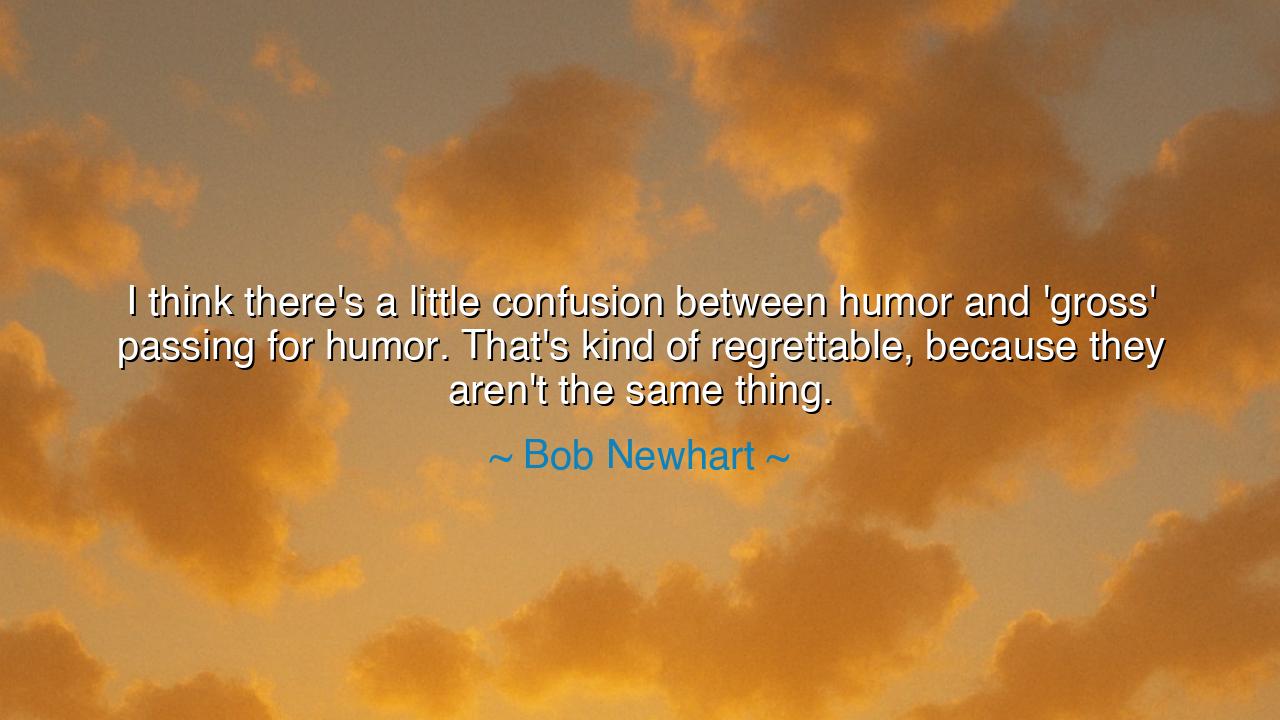
I think there's a little confusion between humor and 'gross'
I think there's a little confusion between humor and 'gross' passing for humor. That's kind of regrettable, because they aren't the same thing.






In the great tapestry of human understanding, there are few things as powerful as the ability to see life through the lens of humor. It is through humor that we reflect, through laughter that we heal, and through wit that we reveal the absurdities of the human condition. Yet, as the great Bob Newhart wisely observed, "I think there's a little confusion between humor and 'gross' passing for humor. That's kind of regrettable, because they aren't the same thing." In these words, Newhart speaks to a truth that has echoed throughout the ages: true humor is not to be confused with grossness, nor is it to be diluted by the cheap, often vulgar imitations that sometimes masquerade as comedy.
The wisdom of the ancients teaches us that humor is a sacred thing, not to be used lightly or for trivial gain. Socrates, the philosopher of Athens, used humor not as a weapon of mockery but as a tool of enlightenment. Through his ironic questioning, he led his students to see the world in a different light, uncovering the hidden truths beneath the surface of their assumptions. True humor, like that of Socrates, does not seek to shock or to degrade, but to reveal the truths that others might overlook. It is the humor that arises from wisdom, from insight into the world’s complexities, and from an understanding of the contradictions that define human existence.
Gross humor, however, is a distortion of this noble tradition. It seeks not to illuminate, but to entertain by provoking discomfort, by pushing boundaries, by indulging in the vulgar and the crude. It may create a laugh, but it is a laugh of distortion, not of truth. Aristophanes, the ancient playwright of Athens, knew the power of humor, yet his works were filled with keen satire and clever irony, not crudeness. His humor was designed to reveal the flaws in society, to hold up a mirror to the absurdity of the world. But even in his sharpest moments, Aristophanes never fell into the trap of grossness—he used humor as a means of enlightening the mind, not shocking the senses.
In contrast, the world today often seems overwhelmed by humor that relies on shock value, on excess, on making the audience uncomfortable for the sake of a laugh. And so, Newhart's words ring with the wisdom of the ancients: to confuse humor with grossness is to dilute its power and its purpose. True humor, when it is pure, comes from a place of deep insight, from an understanding of the world as it truly is—full of contradictions, absurdities, and yet, at the same time, deeply beautiful. It is not a weapon to be wielded carelessly, but a light to be shared, gently illuminating the human soul. Gross humor, on the other hand, often leaves the spirit feeling empty, as it feeds on the lowest parts of our nature rather than lifting us up.
Take the example of Marcus Aurelius, the Stoic emperor. His life was one of great responsibility, yet he often used humor in his writings to reflect on the absurdity of human pride and ambition. But his humor was never crude; it was dry, insightful, and honest. He did not mock the human experience but rather accepted it with a deep understanding. The laughter that his words invoked was not one of shock, but one of recognition—recognition that the human condition, in all its folly, is still worthy of compassion and reflection. Newhart’s humor operates in much the same way, inviting us to laugh at the world not with disdain, but with understanding.
Thus, the lesson we are to take from these great figures, from Newhart and the ancients, is that we must seek to understand the difference between true humor and the gross humor that has come to dominate the stage. True humor lifts us, it challenges us, it opens our eyes to the world’s most profound contradictions. It invites us to see the beauty in life’s chaos, to recognize the truths hidden in its absurdities. Gross humor, however, does not seek to elevate—it seeks only to entertain in the cheapest way possible, to shock, to scandalize, to mock for mockery’s sake. It leaves us no better than it found us, feeding on the darkness of the human spirit rather than illuminating its light.
Let us, therefore, live our lives in pursuit of true humor—humor that comes not from excess, but from clarity; humor that seeks to enlighten, not to offend. Let us look for the insights, the small, subtle moments that reveal the absurdities of life with grace, and let us share those with others. In doing so, we will raise our spirits, and the spirits of those around us, and we will honor the true essence of humor—a reflection of the human experience in all its depth and complexity. Let us laugh at the world, yes, but let it be a laugh of recognition, a laugh that does not mock but understands. This is the humor of the ancients, the humor of wisdom, and the humor of a life well lived.






AAdministratorAdministrator
Welcome, honored guests. Please leave a comment, we will respond soon